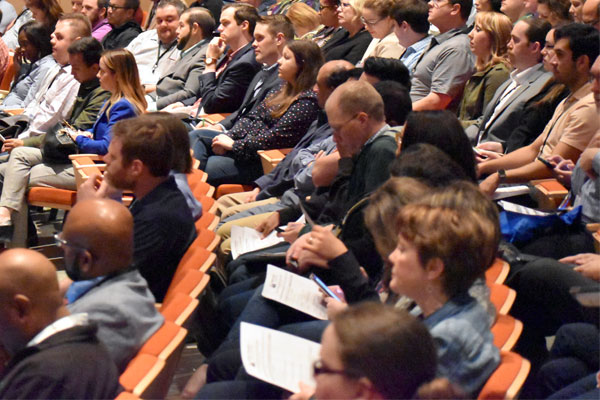
Top fraud professionals gather to share experiences, lead workshops and network
The Fraud Summit, put on annually by the Jindal School’s Center for Internal Auditing Excellence, gathers professionals interested in the latest trends in fraud schemes and fraud prevention.
The two-day summit also offers continuing professional education through workshops and a general conference. The workshops offer 8 hours of CPE credit, and the conference offers another 8 hours of CPE credit.
Fraud Summit by Year
2024 | 2023 | 2022 | 2021 | 2020 | 2019 | 2018 | 2017 | 2016 | 2015 | 2014 | 2013 | 2012 | 2011 | 2010 | 2009 | 2008 | 2007 | 20052025 Fraud Summit
The Center for Internal Auditing Excellence at the Naveen Jindal School of Management hosted its annual premier event, the Fraud Summit, on April 10, 2025 and April 11, 2025.
The 20th Annual Fraud Summit featured a prominent academic and forensic accounting researcher, two leading experts in auditing through the use of automation techniques, and a reformed corporate fraudster.

Dr. Mark Nigrini served as both a keynote speaker and a workshop speaker. Professor, Author, and Acclaimed Authority on Benford’s Law, Nigrini is the 2020 author of “Dusting Your Data for Fraud’s Fingerprints” in the December 2020 Fraud Magazine. During his session, Dr. Nigrini demonstrated AI’s capabilities in natural language processing and generation, communications, queries and interactions within fraud identification and detection landscape. Dr. Nigrini also explored the darker side of AI. He illustrated the nuances of prompt engineering and AI’s ability to learn from your data and queries and, whether explicitly or implicitly, use that information for other purposes.


Keela Davis and Kyle Pott served as keynote speakers for their session titled, “Auditing at Scale: Tools and Techniques to Find the Needle in the Haystack.” In this session, Davis and Pott illustrated the effects of auditing automation techniques to drive effectiveness and efficiency.
This included a broader discussion on cyber-auditing methods and the real-world impact of potential use-cases. Davis, a scientist and engineer by training, and Pott, a former chief technical and security auditor for a Fortune 50 multinational bank, were able to offer unique perspectives on automation techniques that may offer auditors an additional tool in their arsenal while also highlighting that business automation is also a domain to be audited.

Craig Stanland is a TEDx speaker, and best-selling author. In 2012, Stanland made a choice that would cost him everything. After exploiting the warranty policy of one of the largest tech companies in the world for nearly a year, the FBI finally knocked on his door. Stanland was arrested and sentenced to 2 years of Federal Prison, followed by 3 years of Supervised Release, and ordered to pay $834,307 in restitution. Stanland’s workshop focused on the dissection of three real-world fraud cases from the perspective of a fraudster. His keynote, titled “The Anatomy of Choice” offered a deep dive into his own fraud case and why he pursued the choice that would ultimately change his life forever.
Center for Internal Auditing Excellence
Academically, the Center for Internal Auditing Excellence oversees the Jindal School’s Internal Auditing Education Partnership, which offers students a strong program in internal audit and risk management through accounting and information management courses.
The center puts on the Annual Fraud Summit and proceeds benefit center students and the program.
For information on attending next year’s summit, please contact joseph.mauriello@utdallas.edu.
